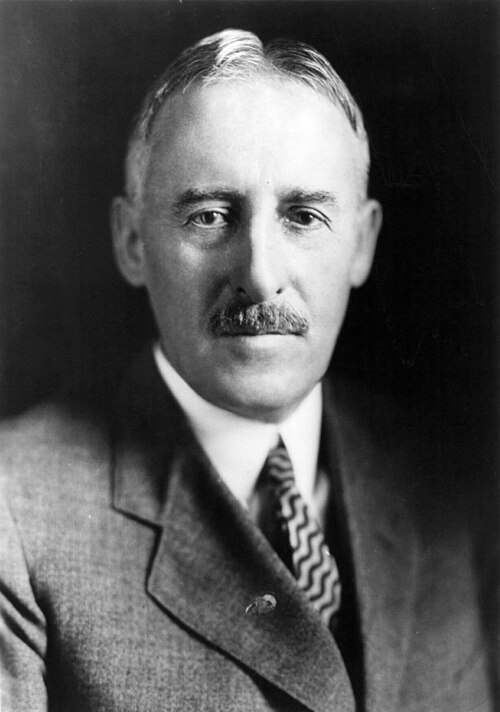Henry L. Stimson
Henry Lewis Stimson was an American politician who served as the twenty-ninth Chancellor of America from 1934 to 1942. Following the decline of Chancellor Frank B. Kellogg for re-election, the Whig Party required someone that could appeal to a broader audience. It had helped that Secretary to the Monarch Franklin D. Roosevelt felt Stimson was a compromise candidate between the Whigs and Unionists. Stimson supported open preparedness, but opposed any form of arms race that could lead to war.
Stimson quickly drew the ire of many in government for his out spoken stance of wishing to have better ties with Great Britain. He had originally served as Secretary of War for Charles Evans Hughes, strongly opposing the Congress of Columbia and American neutrality in the Great War.
His tenure as Chancellor saw major clashes between his cabinet and that of King James I. James wished to have a stronger stance against Japan. Stimson, however, felt the American military was very ill equipped for a conflict. Stimson worked with the American military commands to convince James to create the American Royal Air Force Academy. James wished for a larger military, but Stimson argued for modernizing the military currently fielded.
As a means to delay any tensions in the Pacific, Stimson oversaw the implementation of the Japanese-American Naval Treaty in 1941, a doctrine limiting the naval size of the signatory nations, including those of aircraft carrier capabilities. Stimson championed the treaty as a means of peace between America and Japan. This proved to be short lived, as the following year it was revealed Japan attempted to circumvent the terms by selling their constructed carriers to their allies within the Greater East Asia Co-Prosperity Sphere.
Stimson won re-election in 1938 contentiously, having to mold a cabinet across party lines in order to form a government. However, many turned against his Anglophile beliefs when Great Britain invaded Egypt in an attempt to reconquer the region. Seeing this as a blatant attempt at empire building, Stimson was forced to denounce the maneuver. His voice fell on deaf ears, and Great Britain formed the Commonwealth of Nations.
After leaving office, the American navy leased the island of Guam from the Japanese. Knowing this would increase hostilities with Great Britain, Stimson opposed the maneuver. However, when the Pacific War broke out in 1944, he returned to the Executive Cabinet to volunteer his services. Stimson, working for the War Department, helped orchestrate the tactics of the Battle of Bermuda with Archduke Thomas. The battle proved the American navy could match the Royal Navy in battle, even though the invasion of Europe that was meant to follow was forced to be delayed.
Social
Reign




Comments